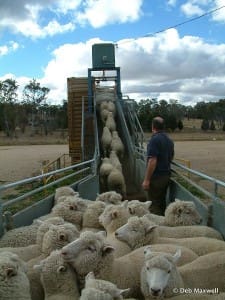Latest listings on Jobs Central:
- Financial Controller (Heytesbury Cattle Co)
- Livestock Foreman – Aronui Feedlot (AA Co)
- Meat Export Sales Trainee (Australian Meat Group)
- Meat Export Salesperson (Australian Meat Group)
- Cold Stores Manager, Yards & Livestock Manager (Northern Co-op Meat Co)
- General Manager – Rural Production (ACC)
- Station hands – Glentana & Wylarah (AA Co)
- Feedmill Leading Hand – Wonga Plains feedlot (Camm Agricultural Group)
- Technical Services Manager (Australian Wagyu Association)
Click here to access these and other exciting meat and livestock supply chain jobs currently listed on Jobs Central.
 MANY sheepmeat or wool industry employers may bypass the formal process of performance reviews with their staff, deeming them unnecessary, time-consuming or too much work.
MANY sheepmeat or wool industry employers may bypass the formal process of performance reviews with their staff, deeming them unnecessary, time-consuming or too much work.
However, reviews can be highly beneficial not only for the employer but also the employee if done correctly.
Reviews are generally conducted so the employer can evaluate an employee’s performance and set goals and tasks to be completed within a set timeframe (e.g. 3 months, 6 months, 12 months).
But they are also useful for an employee to self-evaluate their own performance, determine whether they are meeting the role’s criteria within the business and voice any concerns or ideas they might have with their superior.
So what can employers along the sheep or wool supply chain do to make sure performance reviews are beneficial for all involved?
Be prepared
- Make sure you plan-out the review and have a clear idea of what you want to discuss with the employee in question. Going into a review unprepared means you could miss vital opportunities for feedback and improvement.
- Make sure to give the employee ample notice so they are not taken unaware and can also plan anything they want to discuss with you too.
- Employers should use the review to outline goals so the employee knows exactly what is expected of them in their role. Use the time to go through key areas when the employee is performing well and explain why this is so. Set targets for the next performance review and make sure to follow up the next time you review them.
- As the employer, you should set the tone. Show that you genuinely want them to improve and offer advice so they know you have confidence in their ability. Remember not to make the review a lecture where you are doing all the talking. Let the employee speak and turn it into a conversation rather than a lecture.
Be productive with your time
- Rather than wait and do every review at once for your employees, schedule them so they are based on commencement dates for your staff. That way, you can properly prepare for each one rather than scramble and give vague overviews.
- Employers should never use a review to bring up points, whether positive or negative, for the first time to an employee. Effective managers should be discussing areas for improvement or positive performance on a regular basis with their employee, rather than waiting until a formal face-to-face to bring it up.
- The review should be used to reiterate the critical points of discussion that have arisen throughout these discussions. Make sure to highlight positive feedback and discuss how the employee can continue to improve, but also don’t neglect the areas that need improvement too.
- Make sure both yourself and your employee walk away satisfied. Do not leave issues unresolved and offer them the chance to ask questions of you, such as ‘how can I be a better manager?’ or ‘how often would you like feedback about your performance?’
Source: Meat Processors Pty Ltd

HAVE YOUR SAY